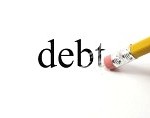 Build a Solid Budget
Build a Solid Budget
It can be hard to adjust a budget to include a loan payment, especially if you’re not used to making one. A good rule of thumb is to separate your budget by the 50-30-20 rule: 50% of your monthly take home income toward living expenses, 30% to discretionary funds, and 20% to debt repayment and savings. Depending upon how many loans you have and the interest rate, you may need to get aggressive and contribute 30% to debt repayment and 20% to discretionary or “fun money”.
Try and find something that works for you, but that allows for you to make progress on your loans.
Set up a Great Debt Snowball
Repeat after me: Paying off as much as you can now will pay off big time later, to prevent compound interest from accruing.
One great way to accomplish this is by setting up what is called a “debt snowball.” In the debt snowball, you list all of your loan amounts and putting those with the highest interest rates at the top. The idea is to put all of your extra money to paying off the highest rate loans, and then when that one is paid off, on to the next loan, and so on and so forth. The advantage to this is that you could save thousands on interest.
The only downside to paying down loans with the highest interest rate is that it can take a long time for someone to pay them off and feel successful. So, if it makes more sense to you to pay off smaller loans first in order to feel accomplished and empowered, then by all means- do so. Many find this ”reverse snowball” approach essential to keeping motivated with debt payoff and avoiding debt fatigue.
Continue Reading
 If you have been looking into consolidating your debts, or freeing up cash for an essential purchase, then you will have come across secured and unsecured loans. But which one is best for your situation? Find out right here.
If you have been looking into consolidating your debts, or freeing up cash for an essential purchase, then you will have come across secured and unsecured loans. But which one is best for your situation? Find out right here.



